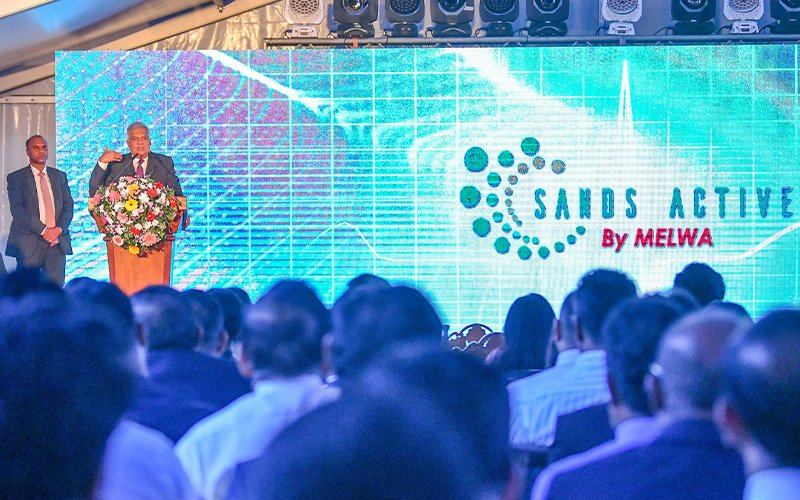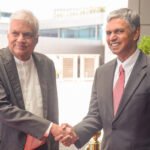
Submission of the Economic Transformation Bill Marks First Step in Economic Revitalization

Next Three Years Aimed at Building A Bright Future for Youth – The President
President Ranil Wickremesinghe announced that the government has initiated the first step towards economic stability by submitting the Economic Transformation Bill. He stressed that regardless of which government or leader takes power, it is imperative to adhere to this agreement to effectively rebuild the national economy. The President emphasized that a proper plan is essential for addressing the country’s economic challenges.
President Wickremesinghe made these remarks during the inauguration ceremony of the Cephalosporin Injectable Plant and the unveiling of the “Meldol” Reliable Relief Manufacturing Facility in Ekala yesterday evening (06).
The new production facilities, initiated by Sands Active (PVT) Ltd under the Melwa Group, represent a significant boost to the pharmaceutical sector. President Wickremesinghe, who unveiled the plaque and inaugurated the factory, also took an observation tour of the new facilities.
During the event, Chairman of the Melwa Group Mr. Periyasamipillai Anandarajah presented a token of appreciation to President Wickremesinghe. In his address, the President pledged to work over the next three years to create a prosperous future for the nation’s youth, who currently face uncertainty.
The President also expressed his gratitude to the Melwa Group for its substantial contributions to the national economy across various sectors. He highlighted that these projects have generated numerous job opportunities for the youth, significantly benefiting the country’s workforce and the economic development.
Addressing the gathering President Ranil Wickremesinghe further said,
“Today, Sands Active Private Limited has launched a new drug called “Meldol”, which is used for treating headaches. We commend the company for investing in the construction of an additional pharmaceutical factory on these premises.
We also supported the decision made by the former Health Minister Dr. Rajitha Senaratne, to establish a buy-back facility for medicines. This institution exists today as a result of that decision. This development is beneficial to the industry and represents a positive situation.
In fact, a factory supplying medicines to the local market has started as a result of this initiative. However, Sands Active has already decided to export a portion of its products, recognizing their export potential.
They have opened a large number of factories so far, and we have encouraged them to focus more on exports. This is just one example. The Melwa Group has launched numerous other products and ventures, significantly contributing to the strengthening of the Sri Lankan economy. This group has expanded rapidly over the last few years and has been very successful.
Today, this company has created many job opportunities for young people, and we are grateful for that. This country urgently needs good jobs like these. Unemployment has become a significant problem, with many people earning low incomes. Due to the COVID-19 pandemic and the economic crisis, new job opportunities have not emerged in recent years, leading to four years of persistent unemployment.
As a result, we are now facing the dual challenge of reducing unemployment and alleviating the financial burden on our citizens. According to an analysis by the Department of Statistics in 2019, the country’s multidimensional poverty rate was 15%, which later increased to 25%. If this trend continues, the youth of this country will face a bleak future. Our primary task is to build a better future for our youth, which requires fostering rapid development in the country.
When I became president, the country was in a major economic collapse. Some thought it would take five to six years to recover from this situation. Many people left the country, believing there was no future here. However, I believed that the country’s economy could be brought to a good state in two years. Despite the difficulties and the economic burden we had to bear, we should aim to limit this hardship to a short period, strengthen the economy and build livelihoods. To achieve this, we had to increase VAT, which led to criticism. However, within two years, the rupee strengthened, and we have been able to move forward as a country.
In the recent harvest seasons, we enjoyed a good harvest and saw a resurgence of tourists coming to the country. Thanks to the ability and talent of our people, as well as the government’s sound plans, the country’s economy has progressed. Today, we need to speak with a clear understanding of the real situation in the country; otherwise, discussing gossip serves no purpose.
Many of the young people today are distancing themselves from party politics because it fails to address the real political issues and provide solutions. We must all acknowledge this reality and move forward to find effective solutions to these problems.
In a few months, we will emerge from bankruptcy as a country. We are currently engaged in discussions not only with the IMF but also with creditor countries and private organizations. However, our efforts cannot stop here. Remaining stagnant will only lead to a relapse. Therefore, we must continue to progress. As we move forward, making false promises serves no purpose. Everyone can make empty promises, but today, we have a real task at hand. Let’s focus on fulfilling our responsibilities instead of making empty promises on public platforms.
So far, the government has presented the Economic Transformation Bill, which outlines several goals. By 2027, the country’s Gross Domestic Product (GDP) should grow at a rate of 5%, reversing the current negative trend. After 2027, we aim to achieve an economic growth rate of 8%. As the country develops, it is crucial to maintain this 8% growth rate for at least 15 years. Many countries including China, Vietnam, Malaysia, Thailand, Singapore and Bangladesh, have achieved this level of development. Our country should also strive to reach that status.
Unemployment in the country must be reduced to 5% by 2025. By 2040, our goal is to establish an export-driven economy. We have reached an agreement with the IMF that these objectives are achievable and will advance the country’s economy. Efforts are underway to enshrine this agreement into law. It is imperative that whichever government comes to power, whichever leader assumes responsibility for this country, should continue to uphold these agreements. We have taken the first step towards rectifying Sri Lanka’s economy and in the next two or three years, concrete action must be taken to instill new hope in young people for a brighter future.
It’s essential to increase the income of the people and create new job opportunities. To achieve this target, we have initiated an agricultural modernization program. Currently, rural incomes are low, so we aim to establish an agricultural export economy through modern farming practices to boost rural income. We intend to implement this program with the active involvement of the private sector.
Moreover, new job opportunities are emerging in the country. We aspire to attract 2.5 million tourists to the country annually through tourism. However, the current number of hotel rooms is insufficient to accommodate this influx. Therefore, it’s imperative to construct new hotels to meet the growing demand.
Efforts have also been made to provide credit facilities for the tourism industry. It’s crucial to integrate the government’s vocational training sectors with the private sector to produce professionals who are well-suited for current needs.
Additionally, the government can allocate funds to develop the digital sector, particularly in the IT industry, and support the youth interested in this field.
Currently, around 23,000 individuals with information technology knowledge are entering the workforce annually. This number should be increased to 50,000. Moreover, new factories should be established, and foreign investments should be encouraged. To facilitate this, investment zones spanning 10,000 acres have been created, with a separate authority overseeing them. These investment zones include 3,000 acres in the Hambanthota district, 1,500 acres in the Jaffna district, and 4,000 acres in Trincomalee. Establishing trade zones of this scale will drive significant economic development in the country.
Vietnam, Indonesia, and Malaysia have all demonstrated that economic development is possible, as in Vietnam even in the aftermath of war. As a nation, we cannot continue relying on external support indefinitely. It’s crucial to prepare a bright future for our youth by fostering self-reliance and standing on our own as a country.”
Minister of Tourism, Land, Youth and Sports Harin Fernando,
“Let me express my gratitude for the initiative taken by Dr. Rajitha Senaratna years ago to liberalize the market and ensure Sri Lanka not only imports but also produces medicine. Today, I’m pleased to see Melwa diversifying beyond their primary business into industries that are crucial for Sri Lanka’s development.
During the President’s visit to the site, a humorous moment occurred when he remarked, “I don’t need to be the surgeon anymore because I have ensured the country’s survival.” He deserves applause for his achievements thus far.
I hope Melwa continues to invest in Sri Lanka, particularly in the leisure industry where they are key investors. It’s my duty to wish them success as they grow stronger, contributing to our economic growth. Thank you, and best wishes to Melwa and their team.”
The event was graced by the presence of Members of Parliament Dr. Rajitha Senaratne and Ishaq Rahuman, Senior Advisor to the President on National Security and Chief of Presidential Staff Sagala Ratnayaka, former Minister Felix Perera, Chairman of Melwa Group Mr. Periyasamipillai Anandarajah, Directors of Melwa group Mr. Anupar Shegar, Mr. Vikashan Murugananthan and other distinguished invitees.



